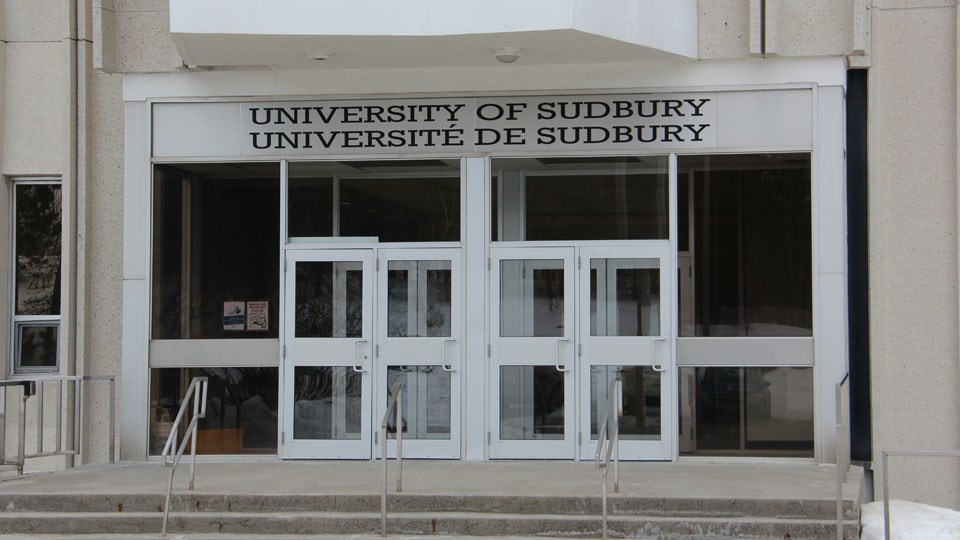The University of Sudbury is anxiously waiting on a commitment from the provincial government to gain access to federal funds that would allow the school to become an independent Francophone institution.
The federal minister of Economic Development and Official Languages, Mélanie Joly, announced a $121.3 million investment over three years to support post-secondary minority-language education last week.
This historic announcement acknowledges the importance of providing government funding to Francophone universities that would not otherwise be able to survive in the current economic and social climate, said a University of Sudbury release.
But to gain access to these funds, the university needs the provincial government to agree to spend “a small sum” to administer the funds.
“We want part of that money to flow through the community,” said University of Sudbury president Serge Miville.
“If we don’t act on this, Sudbury is going to miss out on millions of dollars that would be put towards Francophone post-secondary education.”
Laurentian University sought protection under the federal Companies’ Creditors Arrangement Act (CCAA) in February 2020. As part of the insolvency proceedings, a total of 100 professors were dismissed and over 60 programs were cut.
Laurentian also cut ties and shared funding with the University of Sudbury, Huntington University and Thorneloe University.
The University of Sudbury said these cuts have disproportionately affected French-language courses.
As a result, the school announced its intention to become an independent institution run “by and for” the Franco-Ontarian community.
The university developed a 53-page business plan that details what a comprehensive, publicly assisted French-language university institution would look like in Sudbury with the intention of welcoming students this fall.
But its funding pipeline, which ran through Laurentian University, was cut off during the insolvency proceedings.
The university has written two letters to the provincial Ministry of Colleges and Universities to discuss its options moving forward, but both of them have so far gone unanswered.
Miville said it’s “curious and worrying” that the province isn’t jumping on this opportunity because inaction will be really devastating to the Francophone community in northern Ontario.
“Normally, when the federal government earmarks money like this, the provincial government needs to match up to 50 per cent,” he said.
“This is different. We’re talking about administrative fees over a period of three years which are trivial at best. That’s a few hundred thousand dollars which would allow us to have access to vital federal funds.”
This is almost a risk-free opportunity for the province, he added.
“If Minister Jill Dunlop does not get into contact with the federal government to sign this agreement before Oct. 14, then these earmarked funds for French-language postsecondary education will not flow to Sudbury,” he said.
“We need to find a way to reassure parents, students, stakeholders, the community and Sudbury at large that we’re still an important destination for post-secondary education and that funding would really help send that message.”
Miville said the University of Sudbury remains optimistic because it has a credible plan going forward, and its talks with civil servants have so far been productive.
“Whenever I speak to civil servants, they are incredibly enthusiastic but there’s a silence from the minister’s side,” he said.
“But we do have a really good plan, and our heart is in the right spot. Now, there’s this huge influx of money that could come in which wouldn’t require a massive investment from the province, so all the boxes are being checked right now.”
The University of Sudbury still hopes to welcome students in the future, but it is the technical details standing in the way.
“Every university program needs to be accredited. We had our accreditations, and part of our letter was sort of asking do we still have our accreditation now that we’re an independent French-language university?” said Miville.
“We are waiting on that answer. We sent that question a few weeks ago now, so the more time that passes where we don’t have a concrete answer, the less we can offer students.”
Students have been asking to transfer to the university, but unless the ministry recognizes the programs that have already been accredited, Miville doesn’t want to risk students’ futures by giving them the go-ahead.
“Fortunately, though, we are not starting from nowhere. Once we get the green light from the ministry, we will be able to hit the ground running,” he said.
“We are also looking to expand the university’s offering. We want to have something to recognize the really important issues in our community.”
Part of this will be programming that attracts students back to Sudbury.
“We’re estimating that each student that’s leaving, it’s around $30,000 a year that leaves the city. If you start counting, that really adds up,” he said.
“I am worried about the economy of our region, and we want to make sure we have a value-added service to make sure we can train a bilingual workforce.”
Miville said that the University of Sudbury plans to make its status an issue in the Sept. 20 federal election.
“I am very happy to say that I am going to be meeting every single candidate of the major parties, and I want them to know what our perspective is for the future of the community,” he said.
“This is not a partisan issue. This is a Sudbury issue. This is a Northern Ontario issue. We keep saying that our communities are shrinking. I really want to be a force to turn that around. This is a local issue that has a national impact.”
Colleen Romaniuk is a Local Journalism Initiative Reporter, a Government of Canada program, at the Sudbury Star.
